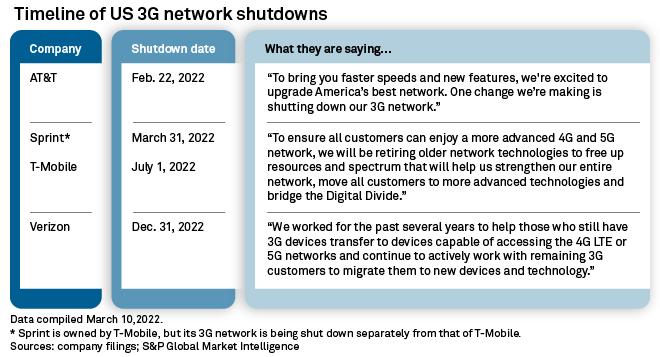With the transition to 5G underway, mobile carriers in the United States have started to retire their 3G services. The transition may cause issues for systems still running on the aging cellular network.
Here is a look at some public safety services could be affected:
Transit information displays: In San Francisco, more than 650 real-time electronic displays at public transportation stops will no longer be able to show vehicle arrival predictions or relevant information. The city’s Municipal Transportation Agency notes that this will not impact the alerts provided on mobile and web platforms.
School buses: Many commercial transportation vehicles like school buses are still reliant on legacy 3G technology, according to a letter to the Federal Communications Commission from the American Association of School Administrators. Upwards of 10% of public school buses could lose GPS and communications services as a result of the network shutdown. The 3G retirement could also affect schools’ COVID-19 contact tracing efforts, the letter said.

Mobile phones: According to the FCC, pulling the plug on 3G will render old phones unable to use data services or receive calls and texts, including emergency calls to 911.
Home security systems: Due to COVID-19 related precautions, technicians have been unable to upgrade many home security systems running on 3G, according to The Monitoring Association’s Alarm Industry Communications Committee. A temporary solution will allow 3G alarm panel radios to roam on T-Mobile’s network until that carrier sunsets 3G on July
Medical alert devices: Individuals using medical alert devices that call an emergency response center will be unable to reach first responders over the shuttered network.
Connected vehicles: Cars that came off the lot a few years ago may be fitted with 3G-enabled in-vehicle telematics devices. Unavailability of 3G will not affect ability to drive, but it could complicate functions like remote start, remote location, integrated navigation and services like OnStar. The phase out could also disable automatic crash notifications and the car’s ability to call 9 from the vehicle.
AT&T first announced plans to shut down 3G service in 2019, reporting that only 1% of its mobile data traffic runs on its 3G network, and retired the network on Feb. 22.Sprint will be next to sunset its 3G network on March 31; T-Mobile and Verizon will follow suit in July and December 2022.
“The best way to ensure you don’t lose connectivity as a result of these phase outs is to do your research and plan ahead,” South Dakota Public Utilities Commissioner Gary Hanson recommended.“Contact your mobile provider or consult your provider’s website for more information about their 3G retirement plan and how it may affect your service.”
He also advised consumers to check on “any medical devices, tablets, smart watches, vehicle SOS services, home security systems and other devices that use cellular connectivity as a back-up when a wired internet connection goes down and other connected products that may use 3G as well.”
